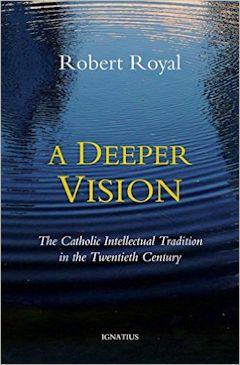
|
Posted December 22, 2015
Book: A Deeper Vision: The Catholic Intellectual Tradition in the Twentieth Century Author: Robert Royal Ignatius Press. San Francisco. 2015. Pp. 619 An Excerpt from the Jacket:
This wide-ranging and ambitious volume is a comprehensive and balanced appraisal of the Catholic intellectual tradition in the twentieth century. The Catholic Church upholds both faith and reason, and Catholicism has given rise to a fruitful exchange between the two, not just in the distant past but throughout the troubled decades of the last century. Robert Royal presents a sweeping account of the important contributions to philosophy, theology, Scripture studies, and literature made by prominent modern Catholics whose accomplishments have been recognized both inside and outside the Church. Among the great figures in this survey are the philosophers Jacques Maritain, Bernard Lonergan, Josef Pieper, Edith Stein, Alasdair MacIntyre, and Charles Taylor, the theologians Romano Guardini, Karl Rahner, Henri du Lubac, Karol Wojtyla, Joseph Ratzinger, and Hans Urs von Balthasar; the literary artists Charles Peguy, Paul Claudel, George Bernanos, Francois Mauriac, G.K. Chesterton, Gerard Manley Hopkins, Graham Greene, Sigrid Undset, J.R>R. Tolkien, and Czeslaw Milosz; and the historian Christopher Dawson, among many others. Royal demonstrates that without rigorous thought, Catholicism --- however welcoming and nourishing it might be --- would become something like a doctor with a good bedside manner but with little knowledge of medicine. The Catholic tradition has always untied emotion and intellect, action and contemplation into a comprehensive whole. Royal shows that we need to know what this tradition has already produced --- especially by the great figures of the recent past --- in order to address the challenges being posed by the modern world. An Excerpt from the Book: The organizing thesis of de Lubac's Catholicism is that the early Church, patristic sources, and great figures such as Augustine and Aquinas all speak of salvation, not in the exclusively individual terms that sometimes marked Catholic piety in the first half of the twentieth century, but in social terms that recognized the Church as the Mystical Body of Christ on its way toward its promised end. Indeed, he characterizes the belief of the Fathers of the Church as all-inclusive: "For them, in fact, in a certain sense, the Church was nothing else than the human race itself, in all the phases of its history, in so far as it was to lead to Christ and be quickened by his Spirit." And he comments in another context that "the Spirit of Christ once came down upon the Apostles not to unite them together in a closed group but to light within them the fire of universal charity." These and many other passages present a clear and unequivocal vision of a Church both social and universal --- and evangelizing by her very nature. Table of Contents: Part One Faith and Reason 1. The Thomist revival and preconciliar Catholic thought 2. Catholic philosophy in a time of turmoil 3. Theology and the throes of modernity 4. Critical interlude: the Second Vatican Council 5. A renewed theology and modern culture 6. The three ages of scripture studies 7. Scripture study after the council Part Two Creed and Culture 8. The emergence of culture as protagonist 9. Freshness deep down things: the Catholic literary revival 10. The two Frances 11. The Motley society and after Conclusion: The pathos of the Catholic intellectual tradition |
|
